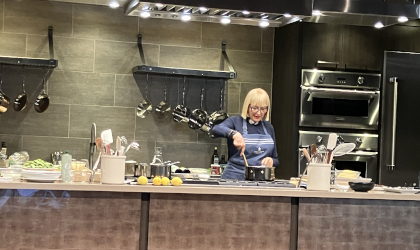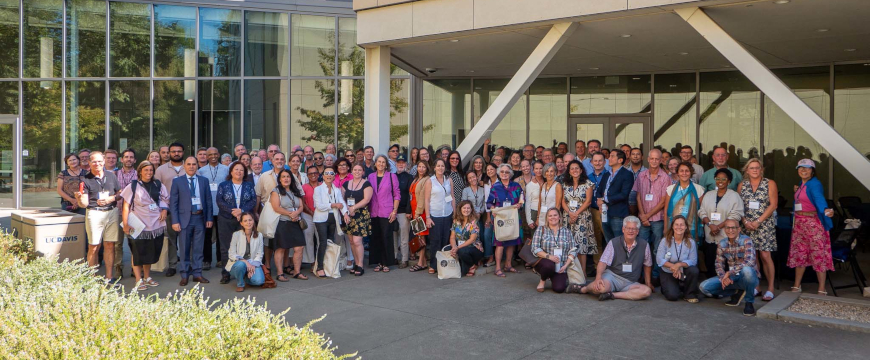Considering human responses to the growing threat of climate change, the International Olive Sustainability Conference drew more than 200 researchers, farmers, and olive sector professionals from over 15 countries. The conference was co-hosted by the University of California Davis Olive Center and the Culinary Institute of America from September 3-5, 2024.
Committee co-chairs for the program (Alexandra Kicenik Devarenne of the Extra Virgin Alliance) and scientific review (Javier Fernandez Salvador, Executive Director of the UC Davis Olive Center) worked with committee members from six olive-producing countries to bring together a diverse group of presenters for a wide-ranging set of presentations and experiences at the Olive Center and the Institute.
The conference’s first day focused on biodiversity, resource conservation, and technology, starting with the situation in California and continuing with a keynote presentation by Abderraouf Laajimi, deputy director of the International Olive Council (IOC). Olives can be an invaluable ally in the fight against climate change, according to Laajimi. This is true because olive orchards function as carbon sinks, with the production of each liter of olive oil capturing 10.65 kg of CO2 from the atmosphere.
Strategies required to adapt to climate change were discussed in the rest of the conference presentations. For example, the value of biodiversity was considered in terms of soil health and genetics as well as the more visible situation in the groves.
Public-private-researcher collaborations such as the Olivares Vivos project and the Soil O-Live program, both of which include Greek partners, help farmers understand and improve the biodiversity of the olive groves that make up a 27-million-acre forest cultivated by humans across much of the globe.
Soil O-Live focuses on healthy soil and how to create it in olive groves that lack it, thus helping to improve both sustainability and olive oil quality. Olivares Vivos emphasizes that the ecosystem services provided by enhanced biodiversity can increase profitability by improving soil health, pest control, and water use efficiency, while payment schemes may offer farmers additional incentives to adopt biodiversity-friendly practices.
Requiring relatively little water and fertilizer, many types of olive trees can help humanity face a drier future. A session on resource conservation and input management considered ways to make this work based on what the trees truly need. Other presentations highlighted the ways technology could be used for more sustainable production, from the grove to the mill.
The conference’s second day was dedicated to climate change, certification, circular economy and community. Early in the day, representatives of the International Olive Council revealed that olive groves offer a potential soil carbon storage capacity of over 47 million metric tons of CO2 per year. The IOC is developing a methodology to calculate the carbon balance of olive groves and create a carbon credit certification scheme for the olive sector.
Unfortunately, it was revealed that so far sustainability certifications include differing criteria and questionable claims—problems that need to be addressed if sustainability is to make a real difference in the market.
The Gen4Olive project, which includes Greek collaborators, focuses on the way diversity in olive genetics can help the sector adapt to climate change. Project members are creating a comprehensive genetic resource guide to help the sector identify olive cultivars that can tolerate the new climatic conditions and breed new varieties that are better adapted to those conditions.
A session devoted to the circular economy considered the large-scale production of multiple products from olive pomace, other innovative uses for olive oil by-products (such as “caviar,” beer, squalene, and biostimulants), and the EU Green Deal’s study of food loss and waste prevention.
The session chair, Dr. Kiriaki Zinoviadou from Perrotis College in Greece, offered an overview of the suitability and environmental impacts of various olive oil packaging options, including the production of bioplastics from olive by-products. Zinoviadou also reviewed some of the research on phthalates and their potential to migrate from conventional plastic containers into edible oils.
The day’s last group of presentations was devoted to the social aspects of sustainability, including health and economic factors. For example, the director of the famous PREDIMED study described the benefits of extra virgin olive oil for both human and planetary health.
The conference’s final day focused on sustainability in the marketplace and sustainable, healthy, delicious eating. Representatives from several olive oil companies described their work on sustainability, biodiversity, regenerative agriculture, and grove and habitat restoration, then the conference moved to the Culinary Institute of American’s Copia campus in Napa Valley.
There the eminent Greek scientist Dr. Antonia Trichopoulou, one of the creators of the original Mediterranean diet pyramid, gave a keynote address focused on health, nutrition, food traditions, and the Planetary Diet (which has also been called Planeterranean). This is a largely plant-based diet consistent with the traditional Mediterranean diet and, more specifically, a traditional Greek diet, using local foods with the same nutritional properties and health benefits as many found in the Mediterranean region.

While a guided olive oil tasting concluded Day 2, Day 3 featured three celebrity chefs’ cooking demonstrations, with extra virgin olive oil as a key ingredient. For example, Greek Chef Maria Loi, star of The Life of Loi: Mediterranean Secrets on PBS TV, created several vegetarian Greek classics: braised green beans with potatoes, fava puree, giant beans, and a village salad. Between demonstrations, Dr. Rosa Lamuela presented a brief summary of her research showing the nutritional benefits of cooking with extra virgin olive oil.
Participants saw that making plant foods central to our meals is better for the planet as well as for people. And as Alexandra Devarenne pointed out, “recognizing the role of olive oil in making these vegetables and legumes delicious as well as nutritious adds to its value in a plant-forward, more sustainable diet.”
Thanks to Alexandra Kicenik Devarenne for sharing the information used in this article, and to the following individuals for the photos that appear with the article: John Boyer for the large group photo, Joseph R. Profaci for the photo of panelists sitting below the conference logo (published with the introduction to the article), and A. Kicenik for the picture of Maria Loi cooking.
All businesses, organizations, and competitions involved with Greek olive oil, the Mediterranean diet, and/or agrotourism or food tourism in Greece, as well as others interested in supporting Greeks working in these sectors, are invited to consider the advertising opportunities on the Greek Liquid Gold: Authentic Extra Virgin Olive Oil website. The only wide-ranging English-language site focused on news and information from the Greek olive oil world, it has helped companies reach consumers in more than 220 countries around the globe.


